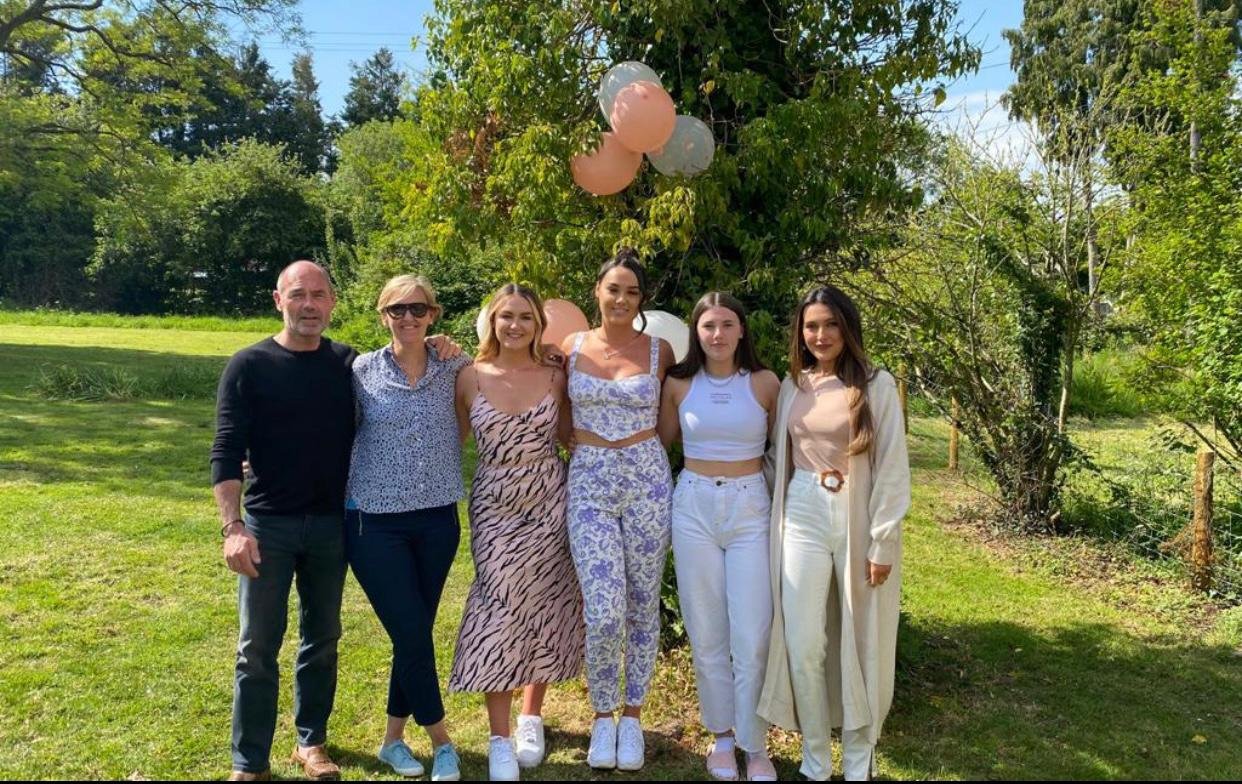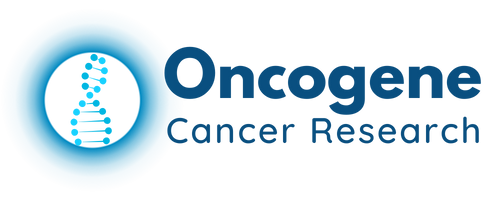Patient stories.

Because of research and my family’s advocacy, I can focus on what matters: Enjoying life.
— Amy Clark (3rd left), with father, mother and sisters, diagnosed with stage IV, ALK-positive lung cancer, age 20
Amy’s story
I was just about to turn 21 and no one had ever mentioned cancer. In a way, I just assumed these were all routine tests.
Amy, 24 years old and from Bristol, UK, loves travelling to cities like Dublin and Amsterdam with her boyfriend Danny and friends. She also enjoys music festivals – and even managed to score tickets to Glastonbury in 2019. She has always been fit and healthy, enjoying nature hiking and strength training.
However, in 2016 Amy started experiencing lower back pain thought to be from a small fall she had on GSCE results day the year prior. Over the next two years, the pain was becoming more persistent, affecting her both in and out of work, so Amy decided to see a private orthopaedic consultant for some scans in November 2018.
Slow road to diagnosis
The private orthopaedic suspected Amy had an unhealed fractured left rib. This was assumed to come from her small fall in 2015 and left to heal on its own. The consultant also spotted a tiny 3mm lesion on her right lung. Amy was referred her to a respiratory consultant who informed her that lesions like hers are typically found in “hardcore smokers;” so given her age and profile, they would simply monitor.
However, the follow up proved slow and Amy wasn’t reviewed until nearly a year later, at the end of 2019. At this appointment, she was informed that whatever was in her lung had now spread into her lymph nodes and she needed to have further tests under the NHS. Importantly, the respiratory consultant never used the word biopsy nor indicated an urgency or the potential for cancer, leading Amy to believe she was simply undergoing some further routine tests. Unfortunately, Amy experienced delays in re-entering NHS care from the private system, and she was only finally seen in April 2020.
Given it was the height of COVID-19 and there was no indication of urgency, Amy called to cancel the appointment over fears of entering a hospital during the pandemic, but a nurse strongly advised her to go in. It was only during the pre-clinical check-in that Amy finally learned the purpose of a bronchoscopy is to identify or rule out cancer.
Bring someone with you.
But I’m only 20
Amy (L), with her mother Jan, co-founder of Oncogene Cancer Research
While Amy couldn’t believe that the team was looking for cancer, after the bronchoscopy, things started to move at pace. A lung cancer nurse specialist rang Amy a week later and asked her to come in, being told “bring someone with you.”
Amy attended the appointment, in April 2020, with her mother Jan (a co-founder of Oncogene Cancer Research). It was then that Amy was told she had stage IV lung cancer with metastases to her left rib and lymph nodes. Amy was a month away from turning 21. The shock she experienced just made her numb.
Amy was initially told she would be having radiotherapy and chemotherapy and was handed a bunch of leaflets. Then about three days later, unexpectedly, she received a phone call informing her that the centre had done biomarker testing - which had never even been mentioned – and found an ALK (anaplastic lymphoma kinase) mutation. Having never heard of oncogene mutations, Amy feared this was yet more bad news. However, she learned this was in fact good news and she would take an oral targeted therapy to control her lung cancer and that this would be more tolerable and effective than chemo and radiotherapy.
Just a few days later, her targeted therapy – Alectinib – showed up through the post and she started her treatment.
Dissatisfied with the status quo
Initially Amy went to her appointments with one or both of her parents. It took a few appointments to get accustomed to being the rare or only person in their 20s in the cancer ward and to feel empowered to ask questions. But as the routine settled in, so did a feeling a frustration. Amy had lots of questions and concerns ranging from potential of consolidated therapy, impact to fertility, mental health and more. However, her oncologist would shut conversations down as quickly as opened, with no explanations.
Amy’s mother Jan began searching for strategies, information, research and hope online. Jan joined a few of the biomarker patient support groups and saw that there were potentially more options. Jan convinced Amy to use her private insurance and move her care to a leading oncologist at a major cancer hospital in London.
Amy says, “The experience was like going from night to day. At the very first appointment, my new oncologist said to me, ‘Right, we’re going to be proactive. We’ll do radiotherapy to get the cancer as small as possible so your targeted therapy can keep the cancer at bay.’ I could feel an immediate sense of relief.”
Shortly after this, in April 2021, Amy underwent 20 rounds of radical radiotherapy to the chest and three rounds of stereotactic radiotherapy (SRS) to the ribs. All of this led to a complete response. Amy resumed life, going back to working, hiking, travelling and music festivals.
Just last year, in April 2023, Amy experienced some minor progression to the hip – and this was treated with three rounds of SRS. This has allowed Amy to remain on her first line therapy.
Amy with her boyfriend Danny
The new normal
Amy’s connections to her family and strong network of friends have been key to surviving her diagnosis. Sadly, many of her closest friends have all been touched by cancer in their families so her friends are comfortable discussing cancer and also treating her like the same person.
A big turn off for Amy is “toxic positivity.” She just believes in taking it day by day. Amy’s advice to anyone newly diagnosed is, “Take it step-by-step. Don’t jump to what the end could look like. There are many steps and options in the middle. Also, know and trust yourself. You don’t have to join the support groups.” Amy also says, “Don’t rule out getting a second opinion. Without that, my story could have been quite different.”
Amy’s diagnosis has also made her remove stress from her life. For example, about two years into treatment Amy changed jobs roles. Her prior role was taking frontline customer service calls from people with cancer at an insurance company. She had been experiencing loads of stomach pains, which she initially thought came from her targeted therapy but most likely were triggered emotions from her own cancer. Amazingly, when Amy changed roles, almost overnight the pain went away.
Amy (L), with her sisters at Glastonbury in 2019
Research brings hope
Amy says, “As someone in my 20s, I don’t want to think about cancer. I feel so fortunate that that my family advocates for research and for me, so I can focus on what matters: enjoying life. My hope is that with more research, we can boost the amount of time we get on our targeted therapies, given we know we will all develop resistance. Knowing there is research taking place every day, just lets me get back to life.”
What’s next for Amy? With more research on the horizon, more good times are ahead. She’s even managed to get a hold of Glastonbury tickets for this year.
February 2024
Sally Hayton, living with stage IV ALK+ lung cancer since 2013
Have you been touched by an oncogene cancer?
While none of us ever expected an oncogene-driven cancer diagnosis, our personal stories inform the medical, research and pharma community on the issues we face. Our stories can also become someone else’s survival guide.
Please get in touch to share your story. This could be the beacon of hope someone desperately needs.








